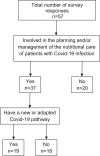A UK survey of nutritional care pathways for patients with COVID-19 prior to and post-hospital stay
- PMID: 33735530
- PMCID: PMC8250968
- DOI: 10.1111/jhn.12896
A UK survey of nutritional care pathways for patients with COVID-19 prior to and post-hospital stay
Abstract
Background: During the global COVID-19 pandemic, UK dietitians have delivered the best care to help patients recover from the infection. The present study examined the development and evaluation of care pathways to manage nutritional care of patients following COVID-19 infection prior to and after discharge.
Methods: Registered UK dietitians completed an online questionnaire comprising 26 questions about the development of a pathway, its use, evaluation and training needs.
Results: Of 57 responses from organisations, 37 (65%) were involved in the planning/management of nutritional care. Only 19 responses had a new or adapted COVID-19 pathway. Of these, 74% reported involvement of dietetic services, 47% reported > 1 eligibility criteria for pathway inclusion and 53% accepted all positive or suspected cases. All respondents used nutritional screening, first-line dietary advice (food first) and referral for further advice and monitoring. Weight and food intake were the most used outcome measure. All pathways addressed symptoms related to nutrition, with the most common being weight loss with poor appetite, not being hungry and skipping meals in 84% of pathways. Over half of respondents (54%) planned to evaluate their pathway and 83% reported that they were 'very or reasonably confident' in their team's nutritional management of COVID-19. Less than half (42%) reported on training needs.
Conclusions: Despite challenges encountered, pathways were developed and implemented. Dietitians had adapted to new ways of working to manage nutritional care in patients prior to and after discharge from hospital following COVID-19 infection. Further work is needed to develop strategies for evaluation of their impact.
Keywords: COVID-19 infection; care pathway; dietitians; nutrition; nutritional care.
© 2021 The Authors. Journal of Human Nutrition and Dietetics published by John Wiley & Sons Ltd on behalf of British Dietetic Association.
Conflict of interest statement
The authors have no conflicts of interest.
Figures





References
-
- NHS England . After‐care needs of inpatients recovering from COVID‐19. 2020. https://www.england.nhs.uk/coronavirus/publication/after‐care‐needs‐of‐i.... Accessed 11 Aug 2020.
-
- British Dietetic Association . Nutrition and the COVID‐19 discharge pathway. Birmingham: British Dietetic Association. 2020. https://www.bda.uk.com/resource/nutrition‐and‐the‐covid‐19‐discharge‐pat.... Accessed 11 Aug 2020.
-
- Bragato L, Jacobs K. Care pathways: the road to better health services? J Health Organ Manag. 2003;17:164–80. - PubMed
Publication types
MeSH terms
Grants and funding
LinkOut - more resources
Full Text Sources
Other Literature Sources
Medical

